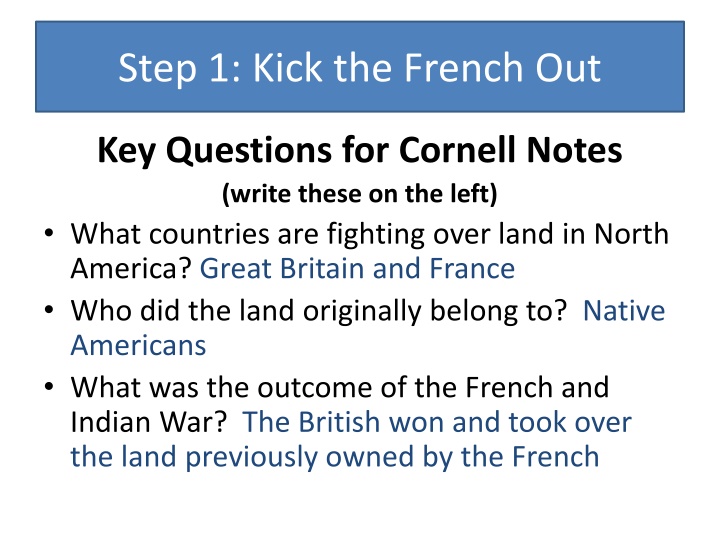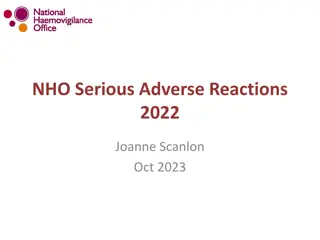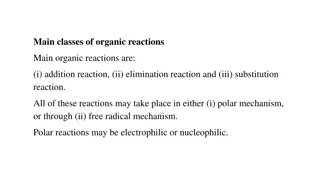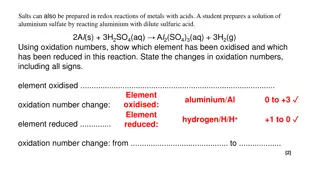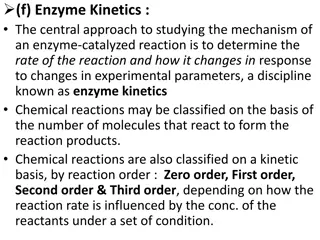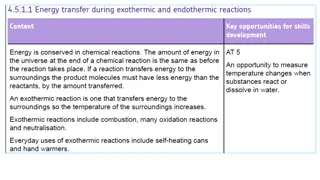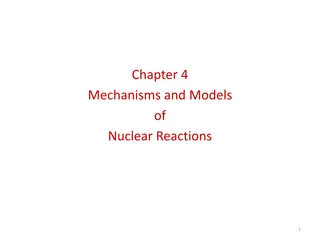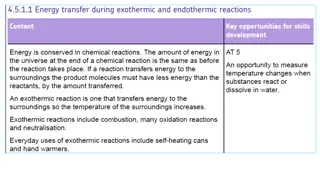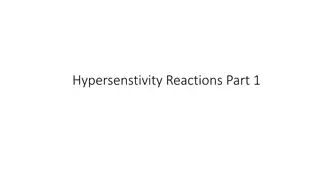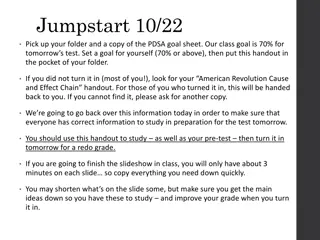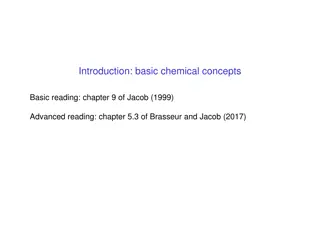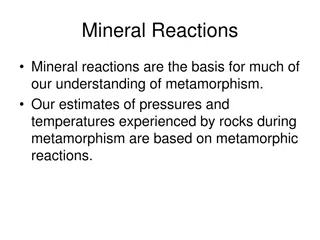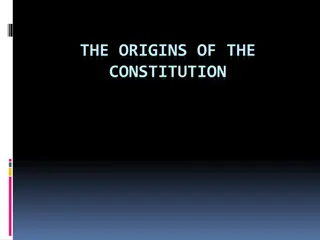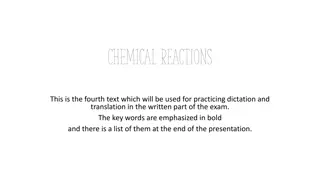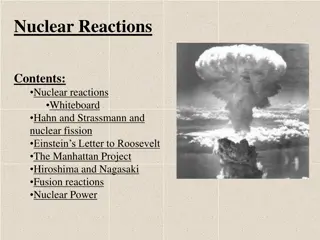American Revolution Key Events and Reactions
The journey of the American Revolution unfolds through key events such as the French and Indian War, British taxation policies, colonial resistance, and the push for independence. Each step led to escalating tensions between the colonies and Britain, culminating in acts of defiance and the start of a revolution, showcasing the quest for freedom and self-governance.
Download Presentation

Please find below an Image/Link to download the presentation.
The content on the website is provided AS IS for your information and personal use only. It may not be sold, licensed, or shared on other websites without obtaining consent from the author.If you encounter any issues during the download, it is possible that the publisher has removed the file from their server.
You are allowed to download the files provided on this website for personal or commercial use, subject to the condition that they are used lawfully. All files are the property of their respective owners.
The content on the website is provided AS IS for your information and personal use only. It may not be sold, licensed, or shared on other websites without obtaining consent from the author.
E N D
Presentation Transcript
Step 1: Kick the French Out Key Questions for Cornell Notes (write these on the left) What countries are fighting over land in North America? Great Britain and France Who did the land originally belong to? Native Americans What was the outcome of the French and Indian War? The British won and took over the land previously owned by the French
Step 2: Tax the Colonists Key Questions for Cornell Notes (write these on the left) Why did the British Prime Minister George Grenville want to tax the colonists? Grenville believed that the colonists owed the British for winning them new land and for providing 10,000 soldiers to protect them. What was the Stamp Act? A tax the colonists had to pay to the British for all paper goods.
Step 3: Hang the Taxman Key Questions for Cornell Notes (write these on the left) Explain No Taxation without Representation in your own words. Colonists aren t willing to pay the taxes without having a say so in the government. What strategies did Sam Adams and the Son s of Liberty use to intimidate the tax collectors/stamp distributors? 1. Hung a doll outside of their house=effigy 2. Broke all his windows/ Andrew Oliver Treatment 3. Chopped off the head of the doll and lit it on fire Were the Son s of Liberty successful in stopping the sale of stamps? Yes, when the tax started, their was no one left to collect it.
Step 4: Try, Try Again Key Questions for Cornell Notes (write these on the left) What does it mean to repeal something? to get rid of it Do you still think the colonists were successful at changing King George and British Parliaments way of thinking? Use evidence from the text to support your answer. No, the British government is already coming up with new taxes. What did the Townshend Act do? Forced the colonists to pay taxes on imported goods, like paint, paper, glass and tea.
Step 5: Refuse to Pay Key Questions for Cornell Notes (write these on the left) What was one way the colonists attempted to outsmart the new taxes? Boycotting, refusing to buy British goods Smuggle, sneak products past the tax collectors What sacrifice did the women make due to this boycott? Tea Do you agree with the actions of Sam Adams, John Hancock and other colonists? Why or Why not? Proclamation of 1763: Stopped Colonists from Moving West of the Appalachian Mountains.
Step 6: Send in the Warships Questions: What was the reasoning behind sending in soldiers? How did the colonists feel about having the soldiers there? How did the soldiers feel about being there? Notes: British soldiers were sent to enforce the law Colonists felt angry and upset about the soldiers being sent to Boston. The soldiers hated being in Boston just as much as the people hated having them.
Step 7: Fire into a Crowd In the text it states, both sides were expecting something to happen. Why? Going into this fight, who do you think has the advantage? Who came up with the name, The Boston Massacre and why did they give it that name? Questions: Notes: The British and the Colonists were both on edge. It was only a matter of time until fighting would begin. Colonists-there are more colonists and they have a better knowledge of the area. British- have better weapons and training to fight. Samuel Adams came up with the name Boston Massacre. He gave the event this name because he knew people would remember it. The name would also turn people against the colonists.
Step 8: Keep the Tea Tax Questions: How did the British government calm things down after the Boston Massacre? Why did they keep the Tea Tax. Notes: British soldiers were removed from the colonies and calmed things down. Parliament repealed the Townshend Acts and taxes on everything except the Tea Tax. Kept the Tax to prove that Britain still had the power to tax the colonists.
Step 9: Throw a Tea Party Questions: What happened at the Boston Tea Party? Notes: December 16, 1773 Colonists dressed up as Indians. They dumped the tea off of 3 trade ships into Boston Harbor. Spectators tried to steal some tea, but the Indians stopped them. Summary: To protest the Tea Tax, the Sons of Liberty dumped tea into Boston Harbor on December 16, 1773.
Step 10: Pay the Fiddler Questions: What does it mean to pay the fiddler? What consequences did colonists face after the Boston Tea Party? Notes: Coercive Acts (Intolerable Acts) To face the consequences Colonists were no longer allowed to elect their own judges or sheriffs. Parliament closed the port of Boston until the colonists paid for the ruined tea. Colonists couldn t hold meetings without permission from British Officials. Parliament sent General Thomas Gage and 4,000 troops to Boston Summary: After the Boston Tea party King George and Parliament passed a series of laws, Coercive Acts, to teach the colonists a lesson.
Step 11: Stand Firm 1. Questions: 1. How did the Intolerable Acts affect the colonists of Boston? 2. What was the difference between the Loyalists and Patriots? 3. How did patriots from other colonies help out the people of Boston? 4. What was the purpose of the Continental Congress? 5. What did George Washington promise to do? Notes: It hurt Boston s economy. Stores closed and jobs disappeared. Patriots were against British taxes and stood by Boston. Loyalists were colonists who supported the King. Patriots from other colonies sent supplies to Boston(beef, fish, flour, rice, cash). The purpose of the Continental Congress was for colonial leaders to get to know one another and to figure out what to do about Intolerable Acts. Washington promised to raise 1,000 troops, give them supplies at his expense, and march to support Boston. 2. 3. 4. 5. Summary:
Step 12: Make Speeches Questions: 1. What decisions did the Continental Congress make? 2. What do you think Patrick Henry meant by I am not a Virginian, but an American? Notes: 1. At the Continental Congress, colonists said the intolerable acts were illegal, decided to boycott British goods again, and agreed to start training army or militia just in case war happens. 2. Patrick Henry felt united with his fellow colonists in their support for Boston. He identified more as an American than a colonist of Virginia. Summary:
Step 13: Let Blows Decide Questions: 1. What did Patrick Henry mean when he said, but as for me, give me liberty or give me death! ? Notes: 1. In this quote, Patrick Henry is implying that he is willing to lay his life on the line to fight for freedom and what he thinks is right. Summary:
